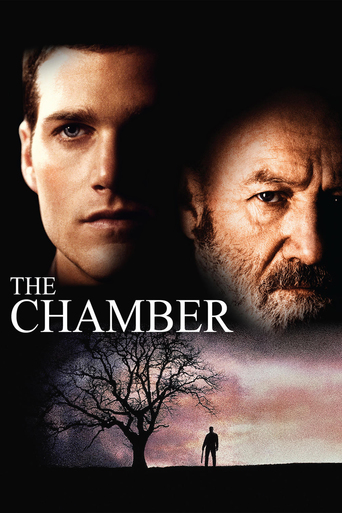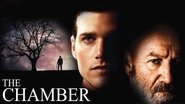moonspinner55
Gene Hackman does everything but shout "I want to live!' in this indictment of the death penalty, of the gas chamber, of hatred and bigotry, of loyalty to disreputable people, of grandstanding politicians and judges, of family shame and secrets...the list goes on and on. Film begins with a 1967 hate-crime down south attributed to a Klansman, charged with the bomb blast that killed two Jewish boys and maimed their father. Fast-forward 30 years: that Klansman, now aged and set to be executed in the Mississippi State Penitentiary in 28 days, is represented on appeal by the grandson he's never met, a young but not incompetent attorney who figures he's his grandfather's only hope. (Family loyalty gets the green light here, though the reasoning behind the kid's pursuit of this case is tenuous at best. Fans of novelist John Grisham may say "the young man's motivation is clear, to heal family wounds and to mitigate his secret shame," but that only works for a book jacket; on the screen, with N-words exploding and hate-speech spewing out of the one lively character, it's another matter.) When Chris O'Donnell is at the jail, being led down hallways and through locked doors to meet racist, grizzled old Gene Hackman--sharper and saltier than the other Death Row inmates we see--one is apt to get "Silence of the Lambs" déjà vu. Indeed, Hackman is a vile cuss who distrusts everybody, but as the drama unfolds--wherein the attorney and his grandfather learn to work together--one has to wonder if this is meant to be the heart of the material or is there something else lying in wait to surprise us. Are we supposed to be sympathetic towards Hackman's poisonous, hate-filled Sam Cayhall just because he's revealed to have a conscience deep down? Or that he didn't work alone? William Goldman and Chris Reese (a pseudonym for Phil Alden Robinson) adapted Grisham's book, and I'm guessing they weren't clear on how much redemption Sam Cayhall should be shown. It's a movie full of muddled logic, nondescript performances (save for Hackman and an overacting Faye Dunaway as Hackman's daughter) and credibility issues right from the get-go. *1/2 from ****
dierregi
Certainly not a cheerful movie or the best of Grisham adaptations, The Chamber still has some merits. Chris O'Donnell looks a lot like Matt Damon (who ended up stealing his thunder) and plays Adam Hall, the lawyer grandson of Cayhall, a racist, convicted murder, waiting for his execution in a Mississippi jail. Hackman plays Sam Cayhall, gran-dad in death row with not a soft bone in his old body - or has he?Hackman's interpretation is amazingly good. His Cayhall is an ignorant brute who lost his youth and family to the demented ideas of the KKK and now feels betrayed by his ancient friends, but still reluctant to let go of his foolish beliefs. Cayhall is truly a tragic figure, an ignorant man, manipulated for purposes he was too stupid to understand and sacrificed by more powerful players. One cannot avoid feeling repelled, yet sorry for him.Dunaway is Lee, Cayhal's alcoholic daughter and - obviously - Adam's aunt. The main problem is that Dunaway was too old for the part. She does a decent job and has a heartbreaking goodbye scene with Hackman - really well acted and not fake or manipulative. However, she is only 11 years younger than Hackman and she was not believable as his daughter. I guess somebody like Patricia Clarkson or Susan Sarandon would have been a better choice.Anyway, for once I think that the 6 in IMDb is a fair vote. The story is too depressing, O'Donnell does not carry enough weight for such a difficult part, Dunaway was too old and the script is very uninspired. To be seen mainly for Hackman's amazing interpretation.
Python Hyena
The Chamber (1996): Dir: James Foley / Cast: Chris O'Donnell, Gene Hackman, Faye Dunaway, Robert Prosky, Raymond J. Barry: Title suggests past torments locked away. Chris O'Donnell plays an attorney whose grandfather is on death row for blowing up a building killing several children. He has 28 days to prove that his grandfather wasn't alone. Faye Dunaway appears as the victim's daughter who reflects upon her father's racial past. After the sentence, the attorney's father leaves behind a suicide note. While not the most pleasant film to engage in, director James Foley does a fine job at creating tension. O'Donnell carries himself well as the lead, who learns much about his family past as well as lure out the guilty. It is obvious that he will accomplish what he came for but the ending regarding his grandfather, particularly the nod by a black inmate seems contrived. Gene Hackman delivers a strong performance as the convict. Dunaway creates the only interesting supporting role as Hackman's daughter who gives insight into the past. Supporting roles are not very broad or interesting. Well made film based on the John Grisham book, and certainly in better standing than the corrupt A Time to Kill and its warped message. It isn't an entertaining outing but its theme of redemption and rekindled love make up for film's shortcomings. Score: 7 ½ / 10
gracescheel
Most reviews on this site, neglect to mention how vividly the film captures the racist politics of the American South at this time. The actions of all politicians reveals how difficult it can be to seek justice. They are always looking sideways. Also the crowd outside the execution site shows how easy it is to stir up mob emotion. Again, nicely laid out and captured on film. The film visually translated Grishelm's understanding of Southern culture and politics. I also thought Chris O'Donnell captured the intensity of someone who is confronting his family's past. The camera work, which holds on his face, assists in helping us to see the quiet determination with which he works. (The camera is a good replacement for the interior monologue of fiction!)I also liked the flash-backs which help him to comprehend just where his father came from and why suicide might have been a response. This film is timely today in lieu of the polarization of American politics. Scary stuff!




